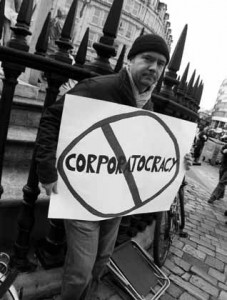 It happened with the dotcom bubble, then, more tragically, with the subprime mortgage crisis, and soon after, most lethally, with the global food crisis. The extreme boom and bust of markets, force-fed and distended by the financial sector.
It happened with the dotcom bubble, then, more tragically, with the subprime mortgage crisis, and soon after, most lethally, with the global food crisis. The extreme boom and bust of markets, force-fed and distended by the financial sector.
After each crash, financial speculators have sought new arenas in which to make quick profits. As the housing market imploded, billions poured into food derivative markets. Food prices mirrored that influx, rising 80 per cent in 2007-8. Over a billion people went hungry. Then the bubble burst and prices crashed, only to break records again earlier in 2011.
AcrossEurope, governments are considering reinstating regulations that kept feral finance out of food markets. But that process could be derailed by the financial lobby, its ideological alignment and nepotistic relationship with decision makers. Current or former staff of Goldman Sachs now lead Italy, the Greek debt agency and the European Central Bank.
Even if public mobilisation wins the battle to curb food speculation, the frontiers of finance are likely to expand elsewhere. From carbon to land to water, natural resources that we all have a right to are being privatised and repackaged so that bankers can gamble with them. Campaigners warn of a glut of questionable carbon credits becoming the next subprime risk. Speculators are fuelling the global land grab – Egyptian financiers have just taken control of a quarter of a million acres of South Sudan. Water could be next. Predicting a global market in water within the next couple of decades, Citigroup economist William Buiter said earlier this year that: “Water as an asset class will, in my view, become eventually the single most important physical-commodity based asset class, dwarfing oil…”
This is what the ‘green economy’ means to most of those inside the Durban climate talks – held, fittingly, in the world’s most unequal country – with next June’s earth summit to take place in the similarly unequal Rio.
It’s said that economists know the price of everything, but the value of nothing. Subject to the shockwaves of speculative finance, we are at risk of no longer knowing either. This makes it all the more critical that movements challenging big finance and austerity come together with those seeking to protect the global commons that we all depend on.
South African groups and La Via Campesina, a movement of a quarter of a billion small scale food producers, are calling for an international day of action on December 5th. Activists are mobilising for climate justice and to reclaim our food system from carbon intensive industrial agriculture and corporate control.
In place of that system, we must recognise food as a right, with decisions made democratically, respecting small-scale producers, women’s rights, local knowledge and the environment. This approach is known as food sovereignty. In practice, it embraces everything from the hundreds of thousands of Landless Workers Movement Brazilians who have occupied uncultivated land to campaigns against supermarkets here in theUK.
In Durban on December 5th, activists will march on the ‘conference of polluters’, take direct action against multinational corporations like Monsanto, and hold an ‘assembly of the oppressed’ to discuss how to end this unjust system.
Here inLondon, on Saturday December 3rd, the LSX occupation will hold a climate justice teach-out, followed by some visits to climate criminals, before finally joining a bigger march. The following evening, you can watch food sovereignty films at theTentCityUniversity. And on December 5th – take action for food sovereignty and climate justice.
By Amy Horton, food justice campaigner at the World Development Movement




